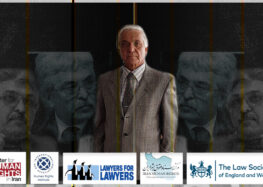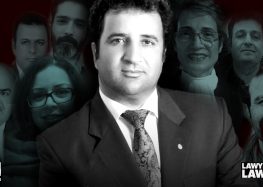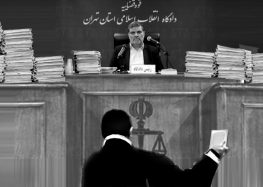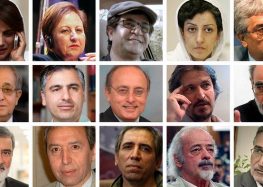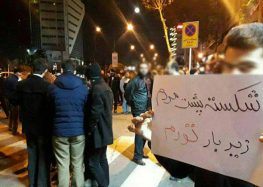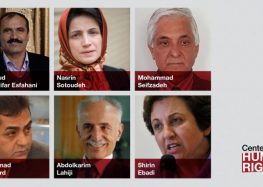“My Client Is Under Pressure; His Life Could Be In Danger,” Says Mohammad Seifzadeh’s Lawyer
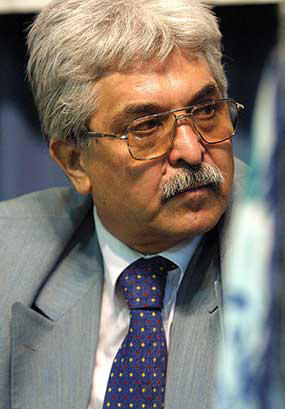 In an interview with the International Campaign for Human Rights in Iran, Marzieh Nikara, lawyer of prominent Iranian lawyer, Mohammad Seifzadeh, said that he has been in detention inside the Orumiyeh Intelligence Office for the past two weeks. Nikara told the Campaign that Seifzadeh had gone to Orumiyeh for a research project, adding that she did not know how and when her client had been arrested. “Unfortunately, when I went to the Orumiyeh Intelligence Office with Mr. Seifzadeh’s son on 23 April, they did not allow me to visit with my client. I don’t even know on what day and where exactly he was arrested, and I wasn’t allowed to read his file, either. Only his son was allowed to see him for about two minutes. He said his father has lost a lot of weight, he was limping, and that it was quite clear he was under pressure,” said Marzieh Nikara.
In an interview with the International Campaign for Human Rights in Iran, Marzieh Nikara, lawyer of prominent Iranian lawyer, Mohammad Seifzadeh, said that he has been in detention inside the Orumiyeh Intelligence Office for the past two weeks. Nikara told the Campaign that Seifzadeh had gone to Orumiyeh for a research project, adding that she did not know how and when her client had been arrested. “Unfortunately, when I went to the Orumiyeh Intelligence Office with Mr. Seifzadeh’s son on 23 April, they did not allow me to visit with my client. I don’t even know on what day and where exactly he was arrested, and I wasn’t allowed to read his file, either. Only his son was allowed to see him for about two minutes. He said his father has lost a lot of weight, he was limping, and that it was quite clear he was under pressure,” said Marzieh Nikara.
“We had no news of Mr. Seifzadeh for two weeks. It appears that he went to Orumiyeh for a research project on 6 April. He contacted his home on 21 April, and informed [his family] that he is inside the Orumiyeh Intelligence Office. But what the investigative judge in the case said was that Mr. Seifzadeh was arrested on 11 April. The investigative judge said that when his case arrived in the branch, he ordered [Seifzadeh’s] interrogator to allow him to contact his family that same day, but this did not happen until 21 April,” said Nikara about how they found Mohammad Seifzadeh in Orumiyeh.
Mohammad Seifzadeh is a lawyer and human rights activist and a founding member of Center for Human Rights Defenders, who was sentenced to nine years in prison and 10 years’ ban on legal practice by Branch 15 of the Revolutionary Courts last October. His case is currently under review by Appeals Court Branch 54. His charges in the case are “collusion and assembly with the intent to disrupt internal security,” “propagation activities against the regime,” and “establishing the Center for Human Rights Defenders.” During the months following the presidential election, Seifzadeh was not able to represent any political cases due to the immense pressure placed on him by judicial and intelligence authorities.
“His charge is ‘acting against national security through illegal exit,’ and he is currently at the Intelligence Office on temporary detention orders. So far, no arguments in support of Mr. Seifzadeh’s intent to exit the country have been presented. If the arguements are presented, I will react accordingly. Otherwise, I will convert his temporary detention orders to bail orders,” said Marzieh Nikara about the reasons for Seifzadeh’s arrest.
Asked how Seifzadeh’s presence in Orumiyeh could have been construed as exiting the country, she said: “This is exactly what our argument is, but the case’s investigative judge argues that Orumiyeh is a border city that has a border with Turkey. His whole argument is why didn’t Mr. Seifzadeh go to central cities for his research projects, and instead went to Orumiyeh.”
“When Mr. Seifzadeh’s activities as a lawyer became limited, he did more research projects. In his interrogations, Mr. Seifzadeh stated that he did research activities in Orumiyeh. I don’t know what the research projects were about, as I have not seen my client yet, but what I could surmise from in-between the words of the case’s investigative judge, was that Mr. Seifzadeh said during his interrogations that he has interviewed about 20-30 Afghani’s for his research project,” she added.
“The important thing is that my client went to Oroumiyeh for a research project and Orumiyeh is a part of Iran, and there are no limitations for any Iranian citizen to enter any city inside Iran. It is questionable how such a treatment has come about,” sair Marzieh Nikara, objecting to the charges against her client.
“His son talked to him in an atmosphere dominated by security. His interrogator was present in the room and they were unable to talk freely, and only greeted each other. But when his son came out, he told me that his father’s beard had grown, he had lost a lot of weight, and when he got up to embrace his son, he had a limp in one of his legs. I asked him whether he could see any signs of physical abuse in his face or hands, and he said that there were no marks on his face or hands, but there was a limp in one of his legs,” said Seifzadeh’s lawyer about his short visit with his son.
Nikara stated that Seifzadeh’s wife thought that her husband’s sentence must have been upheld, and that he must have been transferred to prison, as an explanation for his disappearance. “Now what is important is that my client is ill, he has a heart condition, and if this situation should continue, his life could be in danger,” she concluded.

